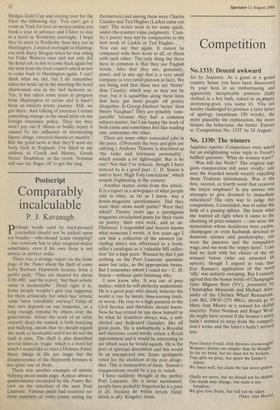Postscript
Comparably incalculable
P. J. Kavanagh
perhaps words used by hard-pressed 1 journalists should not be picked upon too beadily - who should 'scape whipping? - but someone has to play sergeant-major sometimes, even if his own dress is not always in perfect order.
There was a strange report on the front page of the Times about the theft of some hefty Barbara Hepworth bronzes from a public park. 'They are insured for about £100,000,' said the report, 'but their artistic value is incalculable.' Dead right it is. Some people wouldn't give you tuppence for them artistically but when has 'artistic value' been 'calculable' anyway? Value of that sort depends on our response, or a long enough reponse by others over the generations. About the work of an artist recently dead the remark is both toadying and bullying, insists that we should regard the work as invaluable and if we do not the fault is ours. The theft is also described several times as 'tragic' which is a word for which I would like to start a Defence Fund. Many things in life are tragic but the disappearance of the Hepworth bronzes is not quite one of them.
There was another example of artistic bullying on an inside page. A piece about a questionnaire circulated by the Poetry Re- view on the selection of the next Poet Laureate. Various poets had received va- rious numbers of votes (some voting for themselves) and among them were Charles Causley and Ted Hughes (Larkin came out top). The writer went in for some quick, under-the-counter value judgments. 'Caus- ley's poetry may not be comparable to the best work of Larkin or Ted Hughes . . You can say that again. It cannot be compared with their work at all, or theirs with each other. The only thing the three have in common is that they use English words. Also that they are, genuinely, poets, and in any age that is a very small company (a very small platoon in fact). We are being told that these two are 'better' than Causley, which may or may not be true, but it is squabbles along these lines that have put most people off poetry altogether. Is George Herbert 'better' than Henry Vaughan? They are possibly 'com- parable' because they had a common subject-matter, but I am happy the work of both exists and sometimes feel like reading one, sometimes the other.
There are some other concealed jabs in the piece. (Obviously the boys and girls are rallying.) Anthony Thwaite is described as 'the radio and television personality', which sounds a bit lightweight. But is he one? Not that I've noticed, though I have noticed he is a good poet. C. H. Sisson is said to have 'High Tory convictions', which sounds frightening in the context.
Another matter arises from this article. It is a report in a newspaper of what people said in what, as far as I knew, was a house-magazine questionnaire. Did they want their views made public? Were they asked? Twenty years ago a prestigious magazine circularised poets for their views on poetry, their own work, and so on. Flattered, I responded and heaven knows what nonsense I wrote. A few years ago I saw that a collection of the answers (in- cluding mine) was advertised in a book- seller's catalogue as a 'valuable MS collec- tion' for a high price. Warned by this I put nothing on the Poet Laureate question- naire but ticks, in the appropriate boxes. But I remember whom I voted for - C. H. Sisson - without quite knowing why.
I now know why. It was out of pure malice, which he will perfectly understand. He is a good poet who clearly believes the world is run by mean, time-serving fools, or worse. He rose to a high position in the Civil Service and therefore should know. Now he has retired he can show himself to be what he doubtless always was, a self- elected and dedicated Outsider, like all good poets. He is undoubtedly a Royalist and therefore could hardly refuse a Royal appointment and it would be interesting to see which ways he would squirm. He is the poet of spiritual discomfort and this would be an unexpected one. Some spoilsports voted for the abolition of the post altoge- ther. This is humourless of them. Sissons's exasperations would be a joy to watch.
I have suddenly thought of the perfect Poet Laureate. He is never mentioned, people have probably forgotten he is a poet at all, because he writes novels (fatal; labels is all): Kingsley Amis.






































 Previous page
Previous page